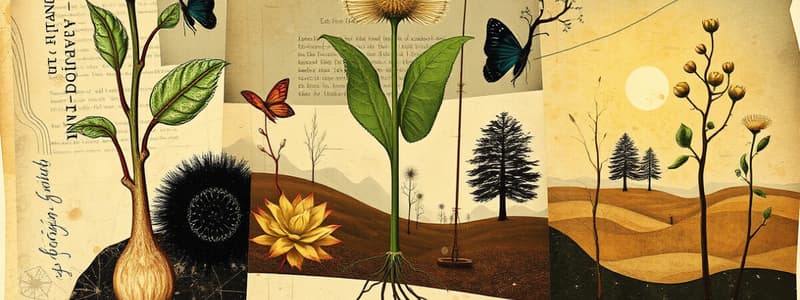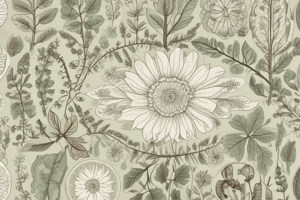Podcast
Questions and Answers
What is the process by which spores form in plants?
What is the process by which spores form in plants?
- Binary fission
- Fertilization
- Mitosis
- Meiosis (correct)
What type of reproduction do gametophytes primarily engage in?
What type of reproduction do gametophytes primarily engage in?
- Sexual reproduction by binary fission
- Asexual reproduction through spores
- Sexual reproduction through fertilization (correct)
- Asexual reproduction through vegetative means
How do most modern plants primarily reproduce?
How do most modern plants primarily reproduce?
- Through direct cell division
- Through vegetative propagation only
- By producing spores
- By using pollen and seeds (correct)
Which part of the plant life cycle represents the diploid stage?
Which part of the plant life cycle represents the diploid stage?
What are the horizontal stems of strawberry plants that can form new plants called?
What are the horizontal stems of strawberry plants that can form new plants called?
What characteristic do spores have that aids their reproduction?
What characteristic do spores have that aids their reproduction?
During which generation do plants spend most of their life cycle?
During which generation do plants spend most of their life cycle?
In the life cycle of plants, alternation of generations involves which two types of generations?
In the life cycle of plants, alternation of generations involves which two types of generations?
What type of reproduction occurs when plants use roots, stems, or leaves?
What type of reproduction occurs when plants use roots, stems, or leaves?
What is formed when gametes fuse during the sexual cycle of plants?
What is formed when gametes fuse during the sexual cycle of plants?
Spores are produced by meiosis.
Spores are produced by meiosis.
The kangaroo fern is also known as the cheetah fern.
The kangaroo fern is also known as the cheetah fern.
Haploid individuals are known as sporophytes.
Haploid individuals are known as sporophytes.
Modern plants primarily reproduce sexually using spores.
Modern plants primarily reproduce sexually using spores.
Asexual reproduction in plants can occur through roots, stems, or leaves.
Asexual reproduction in plants can occur through roots, stems, or leaves.
All plants spend most of their life cycle as haploid gametophytes.
All plants spend most of their life cycle as haploid gametophytes.
Gametes are produced by mitosis during asexual reproduction.
Gametes are produced by mitosis during asexual reproduction.
Stolons are the horizontal stems of strawberry plants that form new plants.
Stolons are the horizontal stems of strawberry plants that form new plants.
The life cycle of a plant involves only sexual reproduction.
The life cycle of a plant involves only sexual reproduction.
Alternation of generations refers to the switch between haploid and diploid stages in the plant cycle.
Alternation of generations refers to the switch between haploid and diploid stages in the plant cycle.
Study Notes
Plant Reproduction
- Plants reproduce through both sexual and asexual methods, not solely relying on pollinators like birds and bees.
- The kangaroo fern features spots that are spores, which are reproductive units that can grow into new individuals without fertilization.
Life Cycle of Plants
- All plants exhibit a life cycle characterized by alternation of generations between haploid and diploid stages.
- The diploid sporophyte generation undergoes meiosis to produce haploid spores.
- Asexual reproduction occurs through spores, yielding haploid individuals known as gametophytes.
- Gametophytes generate haploid gametes via mitosis; these gametes can later fuse during sexual reproduction to form a diploid sporophyte.
Early vs. Modern Plants
- Early plants primarily reproduced via spores and spent most of their life cycle in the haploid gametophyte stage.
- Spores require minimal resources for production and can develop into new plants independently.
- Modern plants predominantly use gametes, evidenced by pollination processes leading to seed formation, with a longer lifespan in the diploid sporophyte stage.
- Many modern plants also engage in asexual reproduction through vegetative methods, such as utilizing roots, stems, or leaves.
Example of Asexual Reproduction
- Strawberry plants demonstrate a form of asexual reproduction using stolons, which are horizontal stems that spread across the ground, potentially forming new plants when they take root.
Plant Reproduction
- Plants reproduce through both sexual and asexual methods, not solely relying on pollinators like birds and bees.
- The kangaroo fern features spots that are spores, which are reproductive units that can grow into new individuals without fertilization.
Life Cycle of Plants
- All plants exhibit a life cycle characterized by alternation of generations between haploid and diploid stages.
- The diploid sporophyte generation undergoes meiosis to produce haploid spores.
- Asexual reproduction occurs through spores, yielding haploid individuals known as gametophytes.
- Gametophytes generate haploid gametes via mitosis; these gametes can later fuse during sexual reproduction to form a diploid sporophyte.
Early vs. Modern Plants
- Early plants primarily reproduced via spores and spent most of their life cycle in the haploid gametophyte stage.
- Spores require minimal resources for production and can develop into new plants independently.
- Modern plants predominantly use gametes, evidenced by pollination processes leading to seed formation, with a longer lifespan in the diploid sporophyte stage.
- Many modern plants also engage in asexual reproduction through vegetative methods, such as utilizing roots, stems, or leaves.
Example of Asexual Reproduction
- Strawberry plants demonstrate a form of asexual reproduction using stolons, which are horizontal stems that spread across the ground, potentially forming new plants when they take root.
Studying That Suits You
Use AI to generate personalized quizzes and flashcards to suit your learning preferences.
Description
Explore the fascinating world of plant reproduction with this quiz. Understand how plants reproduce through spores and the concept of alternation of generations. Discover the unique characteristics of various plants, like the kangaroo fern, and their life cycles.




